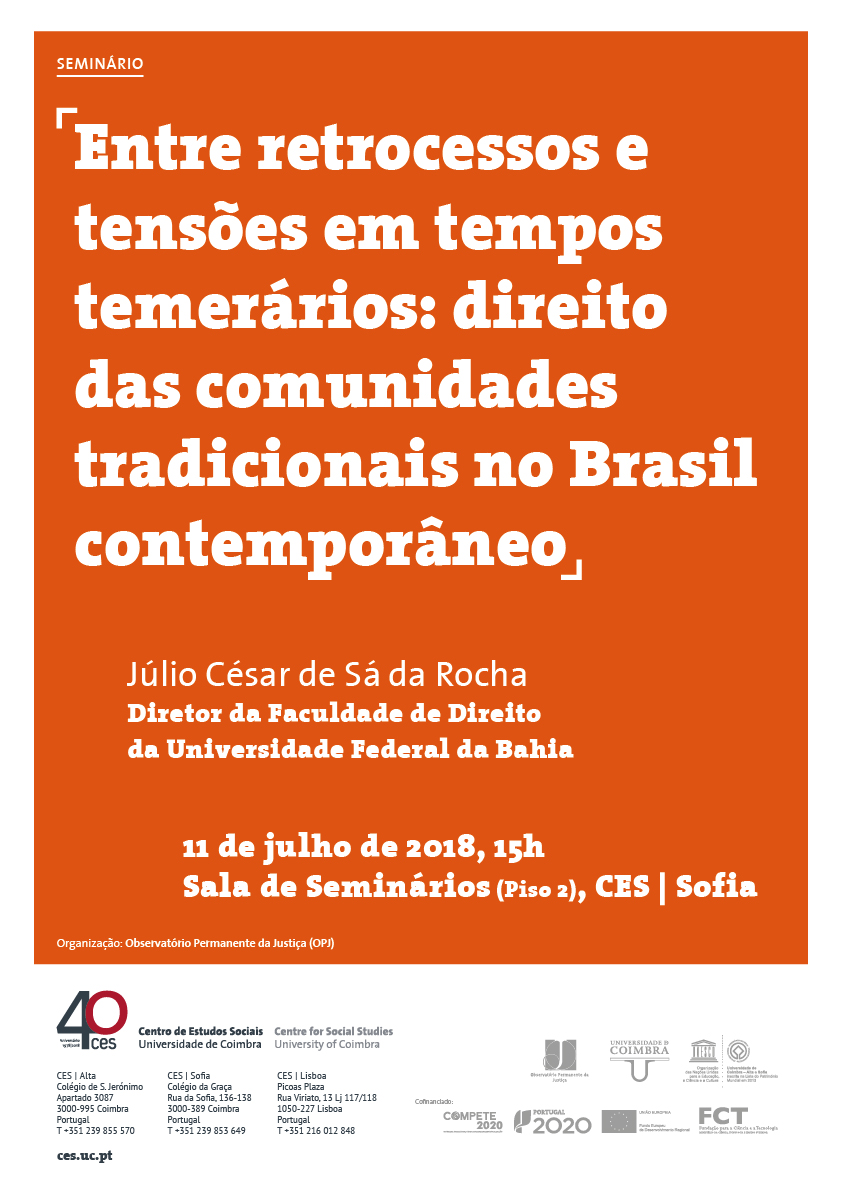Seminar
Between setbacks and tensions in reckless times: traditional communities’ law in contemporary Brazil
Júlio César de Sá da Rocha (Diretor da Faculdade de Direito da Universidade Federal da Bahia)
July 11, 2018, 15h00
Sala de Seminários (2 Floor), CES-Sofia
Overview
The debate on the law of traditional peoples and communities is incipient in Brazil. The emergence of the category of traditional peoples and communities stimulates the recognition of differentiated laws, including collective, overcoming the liberal-individualist model of the citizen born of the bourgeois revolutions of the 17th and 18th centuries. In the words of Boaventura de Sousa Santos there is a process of recognition of new rights that have been guaranteed in "constitutional legal systems, once closed to the recognition of multiculturalism and multiethinicity, have recognized one by one" (...) a varied ethnic and cultural training”. The Constitution of 1988 opened a democratic dialogue with traditional communities through the configuration of legal and democratic pluralism, recognition of their rights. The idea of incorporating the diversity of distinct groups into the category "traditional peoples and communities" is part of a strategic use of the legal system as the driving force behind the process of social change. The national policy of traditional peoples and communities is provided for in Federal Decree 6040/2007. Finally, the development of ethnic law as a legal field is configured in the Brazilian context.
Bio note
Holds a law degree from the Federal University of Bahia (1992), a master's degree in law from the Pontifical Catholic University of São Paulo (1997), a doctorate in law from the Pontifical Catholic University of São Paulo (2001) and a PhD-Exchange Course - Tulane University (2000). Post-doctorate in Anthropology by UFBA (2012). Is currently Director of the Faculty of Law of UFBA (2017-2021), associate professor IV of the Federal University of Bahia, professor of the permanent board of the master's and doctorate in law of UFBA (PPGD), deputy director of the UFBA law school ( 2013-2017), evaluator of the national evaluation system of the Ministry of Education and Culture and coordinator of the Research Group "Historicity of the State, Law and Human Rights: interactions society, communities and environment" of the Federal University of Bahia, was the Nucleus Structuring Teacher (NDE) and Graduation Collegiate of UFBA Law School (2016-2017). He was an IPEA Visiting Researcher for the "Dialogues for the Improvement of the Water Resources Policy and System in Brazil" project. He has experience in the area of Law, with emphasis on Special Rights, working mainly in the following subjects: control and popular participation, environmental law, water resources, environment, health, traditional communities and minorities, biodiversity, History of Law, Sociology, Law and Anthropology. He has experience in international technical cooperation in the area of water management with ABC / MRE and Portuguese-speaking African countries. Participant of COPs in the environmental area (Copenhagen, Madrid, Curitiba) and World Water Forum (Istanbul)
Organisers: Permanent Observatory of Justice (OPJ)


